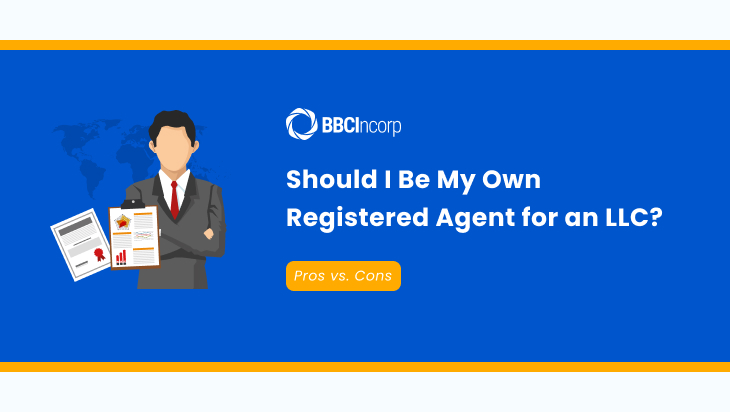
Table of Contents
A registered agent is a designated person or service responsible for receiving legal documents, government notices, and compliance-related correspondence on behalf of a limited liability company. This role is required in all US states for LLC formation and ongoing operations.
Many entrepreneurs ask, “Should I be my own registered agent for an LLC or appoint someone else?”. The answer depends on various factors, including state laws, your business structure, and personal preferences.
This article explores the advantages and drawbacks of serving as your registered agent. We will also discuss the legal obligations, privacy considerations, and practical alternatives available, helping you make an informed decision aligned with your business needs and long-term goals.
What is a registered agent and why is it required?
A registered agent is an individual or business entity appointed to receive legal documents and official correspondence on behalf of your limited liability company. This includes service of process, tax notices, state filings, and compliance reminders. The registered agent must be available during regular business hours and maintain a physical address in the state where your LLC is registered.
Legal requirements in LLC formation
Does an LLC need a registered agent to be formed legally? Yes. In the U.S., designating a registered agent is a mandatory step forming an LLC.
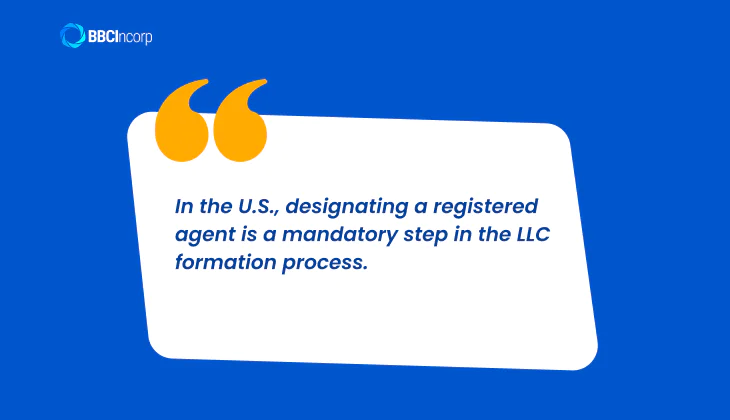
Formed LLC needs a registered agent to be legally
According to the National Association of Secretaries of State, a valid agent ensures that the state can reliably communicate with your business. This helps prevent missed legal actions or overlooked regulatory deadlines.
Maintaining compliance and protection
Do you need a registered agent for an LLC to stay in good standing? Absolutely. A registered agent plays a crucial role in helping your business remain compliant with state regulations. If your LLC fails to receive a lawsuit notice or tax document due to the absence of a registered agent, it may face penalties or lose the legal protections that shield your personal assets. In some cases, your LLC could be administratively dissolved.
Does my LLC need a registered agent if I am the sole owner? Yes. However, you can choose who fills that role. You may act as your own registered agent, designate someone else you trust, or hire a professional service. Many entrepreneurs choose a registered agent service for better privacy, convenience, and consistent availability.
Understanding what a registered agent does and why it is required sets the foundation for your next decision. Can you be your own registered agent? Yes, in most states you can. But whether you should take on that responsibility depends on your business needs, time, and risk tolerance. The next section breaks down the pros and cons.
Can I be my own registered agent for my LLC?
Deciding who should serve as your LLC’s registered agent is an important step that affects your business’s legal compliance and privacy. This decision influences how your company receives critical documents and how much personal information becomes public.
Legal eligibility to be your own agent
Can I be my own registered agent for my LLC? In most U.S. states, the answer is yes. The law permits business owners to act as their own registered agent if they meet certain conditions.
You must be at least 18 years old and maintain a physical street address within the state where your LLC is registered. This address cannot be a P.O. box since the registered agent must be available in person during regular business hours to receive important legal notices, tax documents, and service of process.
Common reasons for choosing yourself as an agent
Many entrepreneurs ask, Can I be the registered agent for my LLC to save money? Serving as your own registered agent removes the need to pay for a professional registered agent service, which generally charges an annual fee.
This option often appeals to single-member LLCs or small business owners who prefer simplicity and direct oversight. Acting as your own agent lets you handle all official correspondence personally, reducing the chance of missed notices or delayed responses.
Important considerations before deciding
While being your own agent offers clear benefits, it comes with responsibilities and potential risks. Can you be your own registered agent LLC and manage all compliance without interruption?
You must be reliably available at your registered address during business hours. Missing a delivery can result in legal consequences, including fines or loss of your LLC’s good standing. Additionally, if you use your home address as the registered agent address, this information becomes part of the public record, which may raise privacy concerns.
Can I be a registered agent for my LLC? Yes, legally. However, before deciding, carefully weigh the pros and cons to determine what fits your business needs and long-term goals.
Should I be the registered agent for my LLC?
Choosing the right registered agent is a crucial decision in the process of forming and maintaining your limited liability company. The role may appear administrative at first glance, but it comes with significant implications for privacy, compliance, and long-term business growth.
Pros of being your own registered agent
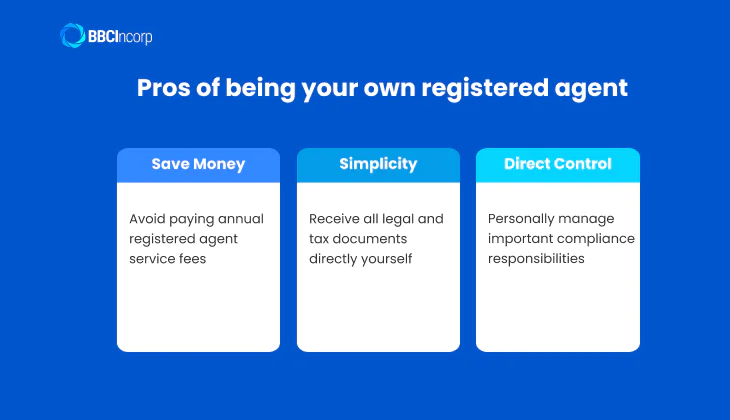
One of the most appealing reasons people consider handling this role themselves is cost. Can I be my own registered agent for an LLC to save money? The answer is yes, and for small business owners, this can be a practical option.
The cost of a registered agent for an LLC from a professional service is typically between $100 – $300 annually. Taking on the responsibility yourself removes this recurring fee, making it an attractive choice for startups and single-member LLCs.
Another benefit is simplicity. If you operate a home-based business or work from a consistent physical location during standard business hours, receiving official correspondence directly may not be a significant inconvenience. Managing legal and tax documents on your own schedule can streamline communication and help ensure you stay on top of deadlines without intermediaries.
There is also the matter of control. When you are your own agent, you receive service of process, compliance notices, and tax-related mail immediately and personally. For some business owners, this provides peace of mind and a sense of involvement in all aspects of business compliance.
Cons and risks of being your own registered agent
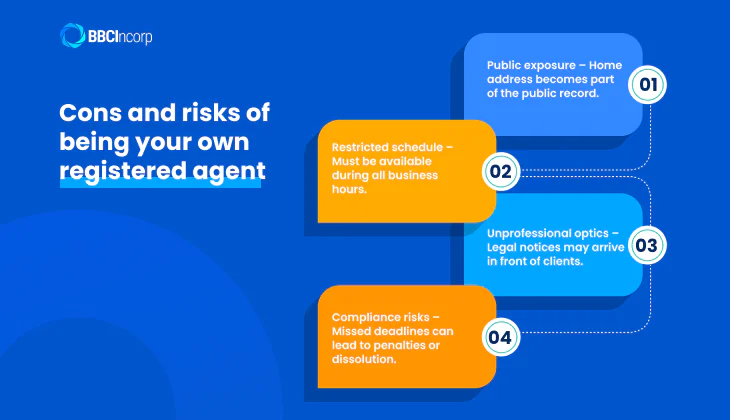
Despite the potential benefits, there are important limitations and risks. The most immediate concern is privacy. When you act as your own registered agent, your address becomes part of the public record. For many business owners who use a home address, this means giving up personal privacy. Your information becomes visible on the state’s business database, exposing you to unsolicited mail and marketing contacts.
Availability is another significant requirement. Registered agents must be physically present at the registered location during all normal business hours. This condition can restrict your ability to attend meetings, travel, or take personal time away from your place of business. If you miss the delivery of a time-sensitive legal notice, the consequences can include legal judgments, late penalties, or even administrative dissolution of your LLC.
Business image is also a concern. Receiving legal documents in front of clients, vendors, or staff can create uncomfortable situations and damage your professional reputation. It may give the impression that your business is unprepared or in legal trouble, even if the documents are routine.
There is also the potential risk of administrative errors. Without a reliable system in place to track notices and deadlines, you could overlook critical filings. The cost of missing a single compliance notice often outweighs the savings from handling the role yourself.
What to consider in summary
If you plan to grow beyond your current state or are considering moving your LLC from one state to another, the situation becomes more complex. Most states require that a registered agent be physically located in the state where the LLC operates. As a result, expansion would require appointing separate agents in each new state or switching to a registered agent service that operates nationally.
So, “Do I really need a registered agent to form an LLC?” Yes. Every state requires an LLC to designate one as part of its formation. The real question becomes who should be the registered agent for an LLC, and whether taking that responsibility yourself aligns with your time, resources, and long-term business goals.
While it is legally allowed in most states, being your own registered agent is a decision that should balance cost savings with legal reliability, personal privacy, and room for growth.
How to legally be your own registered agent
Serving as your own registered agent is permitted in most U.S. states, provided you meet basic legal requirements. This approach can give you more control and reduce costs, but only when done correctly. Here are the key steps to follow to legally serve as your own registered agent.
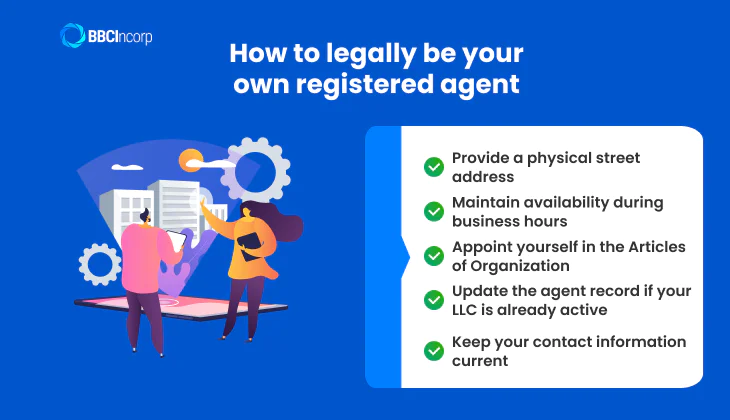
Provide a physical street address
A registered agent must list a physical street address located in the state where the LLC is formed. This location must be able to receive personal delivery of legal and official documents. P.O. boxes and virtual office addresses do not meet state requirements. The purpose is to ensure legal documents reach the business without delay.
Maintain availability during business hours
Registered agents must be available in person at the listed address during normal business hours, usually from 9 a.m. to 5 p.m., Monday through Friday. This is a non-negotiable legal requirement. Courts and government agencies expect that someone will be present to receive time-sensitive materials, including lawsuits, tax forms, and compliance notices.
Appoint yourself in the Articles of Organization
When forming an LLC, simply list your name and business address in the section that requests registered agent details. Once the state accepts your filing, you are legally designated as the agent on record.
Update the agent record if your LLC is already active
To take over this role for an existing LLC, submit a change form to your state’s business filing office. Most states allow this update to be completed online. Approval timelines and filing fees vary by jurisdiction.
Keep your contact information current
Registered agent details must remain accurate. Any change in address or agent status must be reported to the state promptly. Failure to do so may lead to penalties, missed legal notices, or administrative dissolution of the LLC.
By following these steps, you meet all legal obligations to act as your own registered agent and maintain your company’s good standing.
When you should consider a professional registered agent service
Choosing to be your own registered agent may work for some business owners, but it is not always the most practical option. Certain business situations call for the support of a professional registered agent service to ensure ongoing compliance and operational flexibility. This becomes especially important when your setup does not meet the legal or practical requirements for acting as your own agent.
You may need a registered agent service if you do not have a physical address in the state where your LLC is registered. States require a street address within the formation state, and a professional service can provide one. Operating in multiple states also makes it difficult to be your own agent, as each state requires a local contact.
Privacy is another major concern. Using your home or business address for legal correspondence makes it part of the public record. A registered agent service protects your privacy by listing its address instead. Entrepreneurs who travel frequently, work remotely, or keep irregular hours may also benefit from guaranteed availability through a third-party agent.
Lastly, registered agent services help keep track of annual reports, legal notices, and government deadlines. This reduces the risk of penalties and ensures that your LLC stays in good standing.
Benefits of a registered agent service
A registered agent service offers clear operational advantages. It helps you keep your address off public databases, reducing spam and potential legal exposure. These services are available during all business hours, so you never miss an important delivery or court notice.
Company service providers offer compliance tracking and reminders for filings and deadlines. This is particularly valuable for business owners focused on growth or managing multiple entities. For LLCs that operate in more than one state, a registered agent service allows you to consolidate compliance tasks under one provider.
Cost vs. value consideration
Typical registered agent services charge between 100 and 300 dollars per year. While this adds to your operating costs, the value often outweighs the price. Missing a legal document can result in late fees, lawsuits, or even the administrative dissolution of your LLC.
The solution to “Can I be the registered agent for my LLC?” or “Should I be my own registered agent,” involves more than just the cost. A professional service helps you maintain control without sacrificing privacy or compliance. For many business owners, the peace of mind alone makes it a worthwhile investment.
How BBCIncorp can help as your registered agent
Choosing to be your own registered agent may seem simple, but it can quickly become a distraction from growing your business. BBCIncorp provides a practical solution. As a trusted provider with nationwide coverage, we offer company services that help you stay compliant, protect your privacy, and focus on what matters most.
Whether it is a service of process, tax notification, or compliance alert, our expert team ensures every notice is received, handled, and forwarded promptly. You no longer need to stay at one address during all business hours or worry about missing a critical deadline.
Privacy is another major advantage. When you use BBCIncorp’s address, your personal address stays off public records, which protects your personal information from being targeted by unwanted solicitations.
BBCIncorp also provides a dedicated compliance support system. You get automated reminders, document handling on our online platform, and status monitoring to keep your LLC in good standing. This is ideal for business owners who travel often, manage multiple entities, or operate across several states.
Our pricing plan is transparent and customizable according to your practical needs. That’s how BBCIncorp’s services offer long-term value and peace of mind.
With professional service, responsive support, and complete coverage, we streamline the incorporation of your offshore company without the hassle. Visit our service site today for more information on how we can help!
Conclusion
Deciding whether “Should I be my own registered agent for an LLC?” or not depends on your capacity to manage compliance, stay available during business hours, and protect your privacy. The cost savings may appeal to some, but the risks can disrupt your operations and expose your personal information. If you are asking, should I be my own registered agent or do you need a registered agent for an LLC, consider the long-term impact on your business.
In case you need additional assistance, our team is available at any time with the right help. At BBCIncorp, we provide specialized guidance and dependable registered agent services. Contact us at service@bbcincorp.com for support today.
Frequently Asked Questions
Do you need a registered agent for an LLC?
Yes, unequivocally. Every LLC is legally mandated to appoint a registered agent in the state where it is formed. This requirement spans all 50 U.S. states and the District of Columbia. The appointed agent ensures your business promptly receives crucial legal documents, official government notices, and compliance-related mail. Without a designated agent, your LLC cannot be legally registered or maintain its good standing.
Can I be the registered agent for my LLC in another state?
You may only serve as your own registered agent in a state other than your primary residence if you fulfill that state’s specific requirements. This invariably demands having a physical street address within that state and maintaining availability during standard business hours. If you do not reside or operate from that particular state, you will need to appoint a professional registered agent service or another qualified individual or entity.
What happens if I don’t have a registered agent?
Failing to maintain a registered agent exposes your business to significant risks. Your LLC could lose its good standing with the state, potentially leading to administrative dissolution. This status renders your business ineligible to enter into new contracts or initiate legal action. Crucially, missing vital legal notices, such as service of process for lawsuits or critical tax deadlines, can result in default judgments or substantial financial penalties.
Who should be the registered agent for an LLC?
Your registered agent can be yourself, your attorney, or a third-party service provider. Each choice presents distinct advantages and disadvantages. Acting as your own agent might save initial costs, but it limits your operational flexibility and publicly exposes your personal address. An attorney can offer valuable legal oversight, but it typically comes at a higher expense.
Many business owners opt for a professional registered agent service due to its reliability, enhanced privacy, and the peace of mind it provides. When considering “Should I be the registered agent for my LLC?”, carefully weigh these options to best support your business needs.
Disclaimer: While BBCIncorp strives to make the information on this website as timely and accurate as possible, the information itself is for reference purposes only. You should not substitute the information provided in this article for competent legal advice. Feel free to contact BBCIncorp’s customer services for advice on your specific cases.
Industry News & Insights
Get helpful tips and info from our newsletter!
Stay in the know and be empowered with our strategic how-tos, resources, and guidelines.





